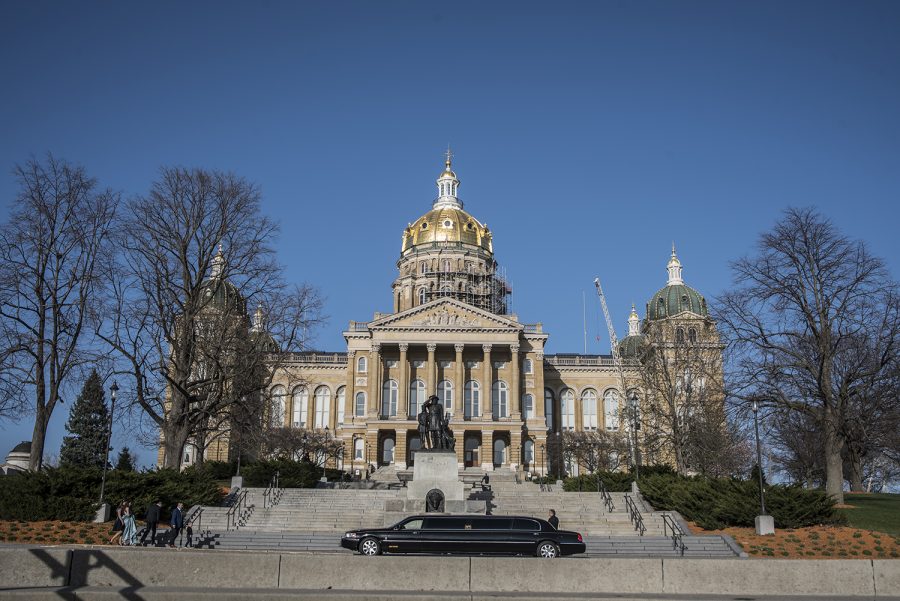Iowa employers would be required to check employee immigration status with E-Verify under bill
Iowa legislation gaining momentum could require the internet-based E-Verify program to be used as a tool to bar the employment of undocumented immigrants in Iowa.
The Capitol building in Des Moines is pictured on Saturday, April 29, 2018.
February 28, 2019
A bill providing for additional steps to prohibit employers from hiring undocumented immigrants is gaining momentum in the Iowa Legislature, passing a subcommittee Feb. 20.
The measures could mandate that all workers hired in Iowa go through an additional background check to ensure their legal-immigration status. Businesses would have to certify the legal residency of their employees with the federal E-Verify program or risk losing their licenses.
E-Verify is an online system maintained by the Department of Homeland Security and U.S. Citizenship and Immigration Services to curb people from working without legal residency. Employers submit Form I-9 information while hiring, and the website fact-checks the data with records from the Homeland Security and Social Security databases.
Under federal law, utilizing E-Verify while hiring is optional. However, 22 states have enacted legislation requiring employers to use E-Verify, according to the Migration Policy Institute.
RELATED: Iowa considers implementing employee-verification system after Mollie Tibbetts’ death
The debate surrounding the employment of immigrants in Iowa has come under a spotlight after Cristhian Bahena Rivera, the man charged in the slaying of UI student Mollie Tibbetts, was revealed to be an undocumented immigrant. His workplace, Yarrabee Farms, did not confirm his legal working status through the voluntary E-Verify system. The farm owners said in August 2018 they believed they were using E-Verify, but they were instead using an older system run by Social Security.
Sen. Michael Breitbach, R-Strawberry Point, a cosponsor of the bill, said he uses a similar system when hiring semi drivers. He said he thinks using E-Verify will help businesses better comply with federal law despite concerns that businesses will face competition from states with looser restrictions on undocumented immigrants, who are often hired for lower wages.
“I don’t want to put some of our employers at a disadvantage to some of the states that aren’t using this, but I think we need to make sure that employers are employing people that can legally be here, which protects them from future damages and lawsuits from hiring [undocumented immigrants],” he said.
RELATED: UI Dreamers remain safe but want permanent solution
Critics of E-Verify commonly say the system is unreliable. The Iowa American Civil Liberties Union submitted a lobbyist declaration against the bill on the grounds that the system results in too many errors and poses a threat to workers’ privacy.
Veronica Fowler, the Iowa ACLU communications director, said the database incorrectly flags 1 percent of people as having undocumented immigration status.
“That might seem tiny,” she said. “But there are more than 800,000 workers who are hired each year in Iowa. So that means 8,000 people each year would be incorrectly identified as not being authorized to work.”
Fowler said E-Verify also doesn’t do a good job at what it’s intended to accomplish. According to the Government Accountability Office, only 46 percent of undocumented immigrants are correctly identified, she said.
RELATED: UI law students work to bring a safe future for immigrant community
“About half of undocumented workers will make it through the system because E-Verify often can’t catch falsified information,“ Fowler said. “No matter what your position is on immigration or undocumented immigrants in particular, E-Verify is a poor option.”
There is a movement federally to mandate E-Verify as well. Sen. Chuck Grassley, R-Iowa, reintroduced the Accountability Through Electronic Verification Act on Tuesday, which would require all states to adopt the system.
Sen. Julian Garrett, R-Indianola, who cosponsored the Iowa bill, said he thinks mandating E-Verify an important next step because it would level the playing field for law-abiding businesses.
“It’s just not fair to Iowans who are honest people in business,” he said. “They have to compete with employers who are hiring people who are in the country illegally because they can hire at cheap wage rates. They have a competitive advantage over the people that are obeying the law.”






